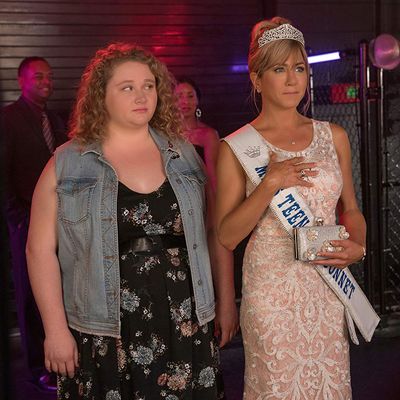
On its surface, Dumplin’ is a slight, charming comedy about beauty pageants and learning to be yourself, but watch closely enough and you might see some of the new moves it brings to an otherwise predictable routine. Based on Julie Murphy’s 2015 young adult book, the film follows plus-size teen Willowdean Dickson (Danielle Macdonald), whose mother, Rosie (Jennifer Aniston), is a former beauty queen who continues to obsess over the town’s local pageant. Mom and daughter don’t get along too well: Rosie’s world of hairspray and tight dresses and perfect posture — a big deal in their town of Clover City, Texas — means nothing to Willowdean. But in some ways, the teenager is a lot more grounded than the grown-up. Seemingly content being herself, Willowdean displays a cutting sense of humor and a certain devil-may-care confidence, instilled by her late aunt Lucy, who also fostered an undying love for Dolly Parton in the young girl.
Willowdean’s war of attrition with her mom reaches new heights when she discovers among her late aunt’s things a half-filled-out entry form for a beauty pageant back in 1993, when Lucy was herself a teen. Realizing that her confident, heroic aunt probably never submitted the form due to insecurities about her own weight — mom makes a point that she and her sister were both heavy as kids but that Rosie lost the pounds — our heroine decides to enter the local pageant. Which her mortified mother just happens to run.
Joining Willowdean at the pageant are her cheerfully supportive best friend Ellen (Odeya Rush), as well another heavy-set girl from school, Millie Michalchuk (Maddie Baillio), and take-no-shit metalhead lesbian Hannah (Bex Taylor-Klaus). Their initial plan is to completely upend and ruin the event, as a revolutionary act, but then they start to enjoy some of the dancing and the songs and the idea of getting up onstage and proving what they can do. So, why not help change the system from the inside?
That’s where the valiant vision of Dolly Parton, with her sassy, glamorous form of headstrong rebellion, comes in handy. Together, the girls go to a local bar where drag queens lip-synch to Dolly songs. When it turns out that Lucy herself was once a regular there, the quartet are embraced by the performers and clients, and soon enough, these young women are getting a crash course in being the best possible versions of their true selves. (The soundtrack, needless to say, is awash in Dolly Parton songs, which is kind of awesome.)
For a seemingly frivolous teen comedy, Dumplin’ has to keep a lot of balls in the air. Here’s where director Anne Fletcher’s light touch helps tremendously. She made a couple of the best romantic comedies at the tail end of the genre’s heyday — 27 Dresses and The Proposal — and she has a way of instilling basic comic conflicts with a heady dose of humanism. She often does this by focusing on the chemistry between her actors and simply watching them behave around each other. (Her last feature, the Reese Witherspoon and Sofia Vergara bust Hot Pursuit, didn’t quite work, but still had some lovely performances.) One of the pleasures of Dumplin’ is watching the four young actresses work together, as they look to bend the competition to suit their own identities. It helps too that Fletcher is a celebrated choreographer — she also directed the first Step Up film — and goes to town with some of the pageant set pieces.
It’d be easy for Dumplin’ to settle into just another competition narrative, or to keep playing up the conflict between Willowdean and her mom, or to focus primarily on its romantic subplot. (The protagonist has a crush on the hunky grill-man, played by Luke Benward, at the diner where she works —but doesn’t know how to respond when it turns out that he might like her back.) The movie purposefully steers clear of all that. The pageant scenes are delightful, but they mostly avoid focusing on the competition itself, on the minutiae of who might win and who’s ahead.
More importantly, the fraught relationship between Willowdean and Rosie manages to retain its complexity throughout. Mom is never seen as callous or cartoonish, but rather as someone who learns to accept that her daughter can be a part of her beloved pageant world without changing who she is. For her part, Aniston does a fine job balancing Rosie’s broader elements with what feels like a genuine concern for her child.
And the romantic subplot, thank god, feels like an afterthought, albeit a touching one. Willowdean’s worth as a person is never pinned to her ability to win the guy in the end; even so, Macdonald’s scenes with Benward have an affable, offhand quality that suggests they’d be good together. Maybe that goes to the heart of what makes Dumplin’, for all its sweet familiarity and simplicity, so often feel like a breath of fresh air: This world feels so lived-in, and its characters so engaging, that you often find yourself wondering what they’ll do once the cameras stop rolling.


